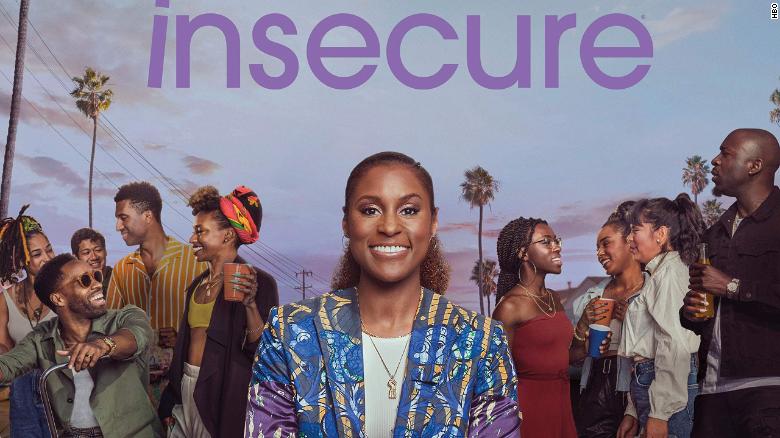Perfect Storm for Diversity Push in Network TV
Journal-isms Fund Drive Continues
Support Journal-isms
Issa Rae, left, and Prentice Penny sit down with Amanda Seales on HBO’s “Insecure.” Eric Deggans said, “Folks like Lena Waithe and Robin Thede and Issa Rae are all trying to build networks of Black creative people and bring them along .” (video) (Credit: HBO/YouTube)
Perfect Storm for Diversity Push in Network TV
The nation’s racial reckoning and the coronavirus crisis have contributed to a perfect storm for advocates of diversity in network television entertainment, according to Eric Deggans, television critic at NPR.
“The good thing about this moment is that I feel like consumers have never had more power than they have now,” Deggans said at a Journal-isms Roundtable held via Zoom (video) on Sunday.
“You can say something on your Twitter page and you can include the Twitter handle of the showrunner, or the director or the lead actor, and it’s possible that person may actually see what you have to say — and it’s possible that thousands of other people may retweet it or agree with what you say.
“I’ve found again that because of the pandemic, actors and some producers have a fair amount of time on their hands, so they’re open to dialogue, and they’re paying attention to their social media feeds.”
Deggans also told the 46 attendees, with 190 more following on Facebook Live, “One thing the executives are afraid of, is becoming that show that everybody wants to cancel.
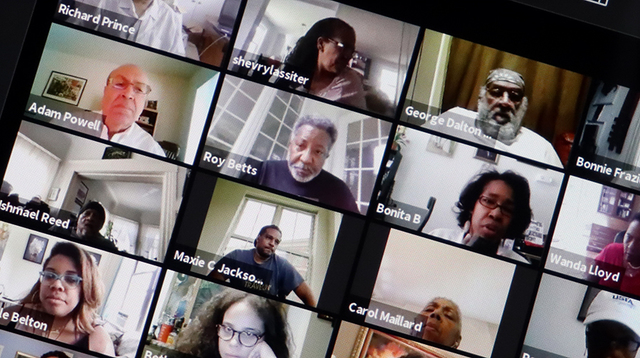
“They saw what happened to ‘Cops.’ They saw what happened to ‘Live PD.‘
“They’ve seen how people are re-evaluating cop dramas. And so anything that gives them the sense that they might become the next show to get canceled makes them nervous and makes them want to listen.
“The executive producers of ‘Survivor’ are meeting with two groups — at least two groups, maybe more, of Black people who have been on the show, alumni, and stepped forward just a couple of weeks ago to talk about how they feel like the show regularly stereotypes Black people and regularly makes it more difficult for them to win the game. And I don’t think that would have happened before this moment, because they are used to shrugging people off, and blowing people off if they don’t agree with the criticism.”
The day after the roundtable, Soraya Nadia McDonald reported for The Undefeated that, “CBS is committing at least 25% of its script development budget to creators and producers who are Black, Indigenous and people of color (BIPOC), starting with the 2021-22 development season, the network announced in a release on Monday.
“It has also set a goal for the upcoming 2021-22 television season that its writers’ rooms will be, at minimum, 40% BIPOC. That mandate will increase to 50% for the following 2022-23 season.
“It’s a significant change in network television that ought to have thunderous effects, not just at CBS, but in the entertainment world at large as Hollywood figures out how to make substantive change with regards to race.”
In addition, Kevin Draper reported the same day for The New York Times, “The nationwide conversation over systemic racism and equality has prompted a series of discussions and forums at ESPN, where Black employees, many of them behind the cameras, have begun speaking out about the everyday racism and barriers they face at the sports media giant. . . .”
Deggans went on to identify the behind-the-scenes managers who are making a difference on inclusion, named the up-and-coming creators of color who deserve our attention, and responded to a challenge that mainstream critics aren’t reporting enough about independent film and television producers who are more interested in portraying Black people accurately than buying into Hollywood stereotypes.
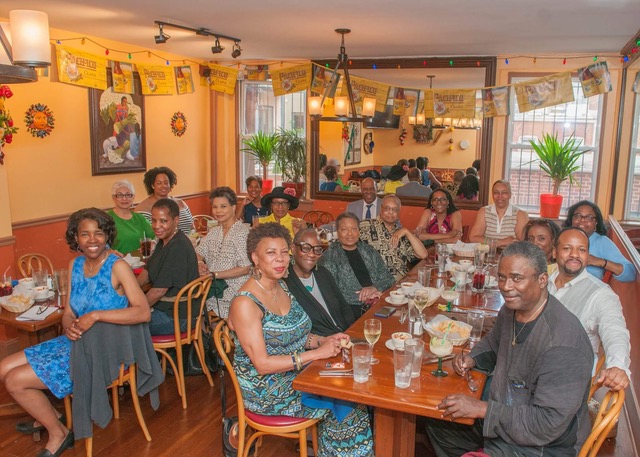
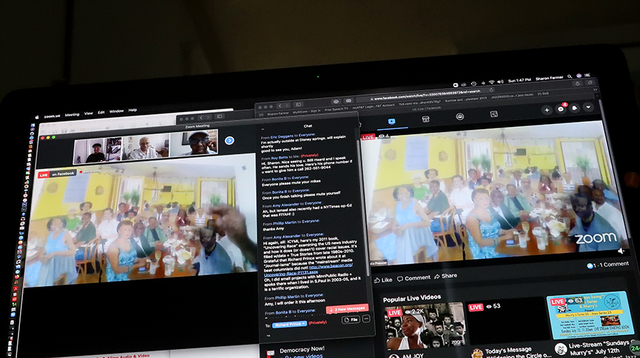
But before that, television news veteran Maureen Bunyan presented a first for the Roundtable group since it began in 1999: Artist Lola Poisson, a Haitian American friend of Bunyan’s, unveiled a 30×40 oil-on-canvas rendering of a group photograph taken at the April 2017 Roundtable session. Poisson said of the photograph, taken by George Dalton Tolbert IV, “The first time I saw the picture I fell in love with it. . . . I said, ‘Wow, this looks like a painting. I have to have it on my wall’.”
Attendees wrote in the chat box, “So beautiful, Lola!” “So I have to have this!” and “Wow!!! Magnificent, Lola!!”
The pandemic has halted much of television production, Deggans said, so it’s difficult to say how much change we’ll see once production resumes.
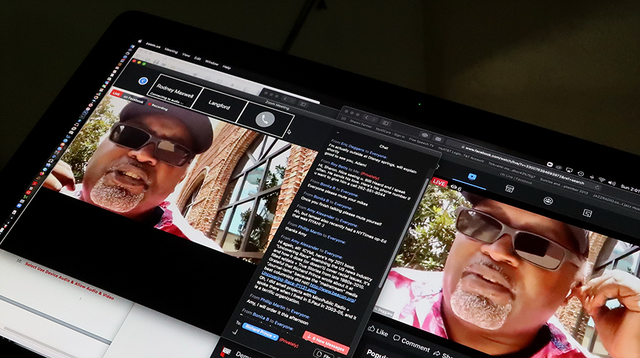
For independent filmmakers, it has meant an escalation in costs, said Leslie Fields-Cruz, executive director of Black Public Media, which represents those creators.
“Filmmakers are getting really creative, they’re doing interviews using Zoom, they’re finding ways to come together, but when you start talking about all of the new procedures and steps you’re going to take . . . when I think about the independent film community, the costs for them are going to go up exponentially . . . the pandemic and the impact of the pandemic is really going to impact the content pipeline, the content coming from our independent filmmakers. . . .””
Fields-Cruz also said that those filmmakers deserve more attention. “There is a lot of coverage of Hollywood, but there’s so much other content that’s being made. Our younger audiences are watching content — they’re not watching regular television. They’re watching content online, TicTok, Twitter . . . They’re consuming it in a very different way than we do.
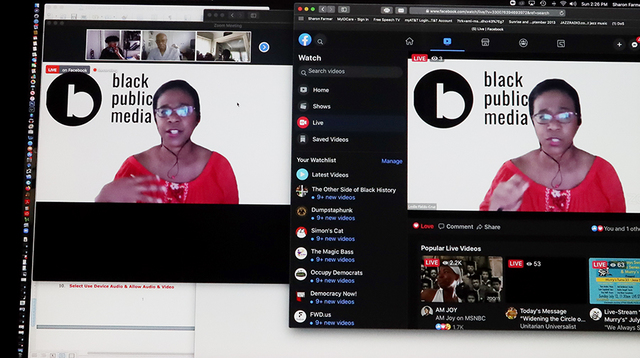
“You mentioned Issa Rae’s outfit, and you know Issa Rae got her start online with ‘Awkward Black Girl”. . . and then all of a sudden, Hollywood took notice because she had all of these people following her. . . and now she’s able to create content — I know she’s got a deal with Netflix, etc., and that’s all fine and dandy, but I think that at this point in time, there’s an opportunity for us to focus on the work that’s not necessarily coming out of Hollywood.
“I know that’s where the money is, but if we’re talking about trying to tell stories that are more expansive of the Black experience and the Black global experience, we’re not going to find those stories in Hollywood. . . . “
Deggans participated in the Zoom call from Disney Springs, an outdoor shopping, dining and entertainment complex at the Walt Disney World Resort in Lake Buena Vista, Fla. He replied, “There are bridges being built between the smaller and more indie-powered projects and organizations and these larger platforms, and I think that is something that should also be encouraged.
“When you look at Diallo Riddle and Bashir Salahuddin, who did both ”Sherman’s Showcase‘ on Comedy Central and ‘Southside,’ you know, they’ve been in the trenches for a long time, and they’ve built up their bona fides until they got to the point’ where they had two shows on two different networks airing on the same day, which I’ve never seen Black creators do.
“I think folks like Lena Waithe and Robin Thede and Issa Rae are all trying to build networks of Black creative people and bring them along so that when Robin does a Black lady sketch show, all the actors, all the writers, all the directors can be Black women, which has never happened before in an industry of sketch comedy on major television.
“So we do, we want to support those indie outlets and we also want to encourage the Establishment to reach down and find the talent. Whenever they say, “Oh, we can’t find a person of color to do XYZ, we can say ‘Hey, we know five people who have done that on indie projects already.’ “
So who are diversity’s Hollywood allies?
“Gloria Calderon Kellett, who’s a showrunner for ‘One Day at a Time,’ that reboot, she’s Cuban American and very clued into diversity issues, very much trying to convince other showrunners to do what she’s done,” Deggans replied.
“Eric Wallace, Black executive producer and showrunner of ‘The Flash,’ someone else who’s very clued into these issues, and is constantly trying to convince the CW and CBS to do better, Shawn Ryan, the white guy who is the co-executive producer of ‘S.W.A.T.’ — he also created ‘The Shield’ — he’s also someone who cares a lot about diversity.
“If you can reach out to these people, and get them on your side, they’re very powerful voices to convince the entertainment establishment to do better.
“To be honest, I think they want to do better. It’s just convincing them to take the bold swings that they have to take to really make a change and they’re just — there’s still a little resistance in pockets of television to doing that. So you’ll have to get allies on your side who will make that case.”
- Nsenga K. Burton Ph.D., National Newspaper Publishers Association: FILM REVIEW — John Lewis: Civil Rights Lion Gets into Good Trouble in Dawn Porter Documentary
- Eric Deggans and others with Jeffrey Brown, “PBS NewsHour”: Hollywood turns scrutiny inward amid national discussion on race and policing
- Meg DeLoatch, Hollywood Reporter: ‘Family Reunion’ Creator Asks: “Was What Happened to My Show Racism?”
- Lisa Respers France, CNN: Issa Rae says the ‘Insecure’ season finale will answer a lot of questions
- Joshua Johnson, MSNBC: Diversity in Media (on new Joy Reid show) (video)
- Michael Malone, Broadcasting & Cable: NBC Grabs Ava DuVernay Unscripted Series ‘Home Sweet Home’
- Dominic Patten, Deadline: Netflix Loses Move To Axe Mo’Nique’s Sex & Racial Discrimination Suit Over Comedy Special Pay – Update
- Tonya Pendleton, the Grio: Lena Waithe wants more Black TV shows to gain Emmy consideration (July 8)
- Peter White, Deadline: Terrence Howard To Star In & Direct ‘Delta Blues’ TV Drama From ‘Ozark’ Producer Zero Gravity Management (July 17)
Journal-isms Fund Drive Continues

“As a veteran reporter, I turn to Richard Prince’s Journal-isms all the time for the latest information on people of color in our business. There is no spin, no slant, just the facts to keep us informed. I also appreciate that he holds journalists and media companies accountable . . . . Keep up the good work. #NoSpinAllowed” (Courtesy Rebecca Aguilar)
— Rebecca Aguilar, freelance reporter; diversity committee chair, Society of Professional Journalists; former vice president, National Association of Hispanic Journalists.
Support Journal-ismsFacebook users: “Like” “Richard Prince’s Journal-isms” on Facebook.
Follow Richard Prince on Twitter @princeeditor
Richard Prince’s Journal-isms originates from Washington. It began in print before most of us knew what the internet was, and it would like to be referred to as a “column.” Any views expressed in the column are those of the person or organization quoted and not those of any other entity. Send tips, comments and concerns to Richard Prince at journal-isms-owner@yahoogroups.com
View previous columns (after Feb. 13, 2016).
- Diversity’s Greatest Hits, 2018 (Jan. 4, 2019)
- Book Notes: Is Taking a Knee Really All That? (Dec. 20, 2018)
- Book Notes: Challenging ’45’ and Proudly Telling the Story (Dec. 18, 2018)
- Book Notes: Get Down With the Legends! (Dec. 11, 2018)
- Journalist Richard Prince w/Joe Madison (Sirius XM, April 18, 2018) (podcast)
- Richard Prince (journalist) (Wikipedia entry)
- February 2018 Podcast: Richard “Dick” Prince on the need for newsroom diversity (Gabriel Greschler, Student Press Law Center, Feb. 26, 2018)
- Diversity’s Greatest Hits, 2017 — Where Will They Take Us in the Year Ahead?
- Book Notes: Best Sellers, Uncovered Treasures, Overlooked History (Dec. 19, 2017)
- An advocate for diversity in the media is still pressing for representation, (Courtland Milloy, Washington Post, Nov. 28, 2017)
- Morgan Global Journalism Review: Journal-isms Journeys On (Aug. 31, 2017)
- Diversity’s Greatest Hits, 2016
- Book Notes: 16 Writers Dish About ‘Chelle,’ the First Lady
- Book Notes: From Coretta to Barack, and in Search of the Godfather
- Journal-isms’ Richard Prince Wants Your Ideas (FishbowlDC, Feb. 26, 2016)
- “JOURNAL-ISMS” IS LATEST TO BEAR BRUNT OF INDUSTRY’S ECONOMIC WOES (Feb. 19, 2016)
- Richard Prince with Charlayne Hunter-Gault,“PBS NewsHour,” “What stagnant diversity means for America’s newsrooms” (Dec. 15, 2015)
- Book Notes: Journalists Follow Their Passions
- Book Notes: Journalists Who Rocked Their World
- Book Notes: Hands Up! Read This!
- Book Notes: New Cosby Bio Looks Like a Best-Seller
- Journo-diversity advocate turns attention to Ezra Klein project (Erik Wemple, Washington Post, March 5, 2014)

